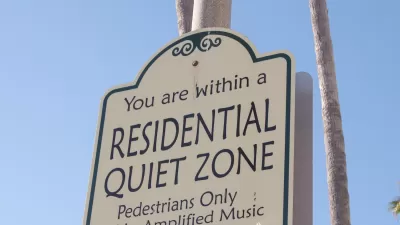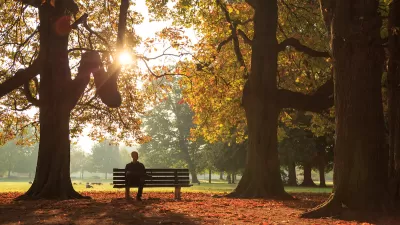Several cities are piloting programs that use machine learning to identify and understand urban noise patterns and enforce noise ordinances.

More cities are taking action to reduce noise pollution and limit vehicle decibel levels, reports Linda Poon, and the process could soon become automated thanks to new sensor technology. A Paris pilot program will install microphones and cameras that can measure decibel levels and help identify the vehicle and driver. "No decibel threshold or fines will be set during the three-month trial period, according to French newspaper Liberation, but it’ll test the potentials and limits of automating the war on sound pollution."
"By now, research has been mounting about the health effects of continuous noise exposure, including links to high blood pressure and heart disease, and to poor mental health." But despite existing noise ordinances, enforcement of vehicle sound limits has been difficult and costly for law enforcement. According to Poon, "Those obstacles have made noise pollution an increasingly popular target for smart city innovation, with companies and researchers looking to make environmental monitoring systems do more than just measure decibel levels."
In New York City, a group of researchers is using machine learning to understand the sources of noise and develop tools that cities and residents can use to get information, understand patterns, and address complaints in excessively noisy areas. With the project already showing promise in Red Hook, where residents were able to use the data to get trucking routes moved away from residential streets, the group hopes to work with the city to implement the project at a larger scale.
FULL STORY: Can Sensor Technology Cut Noise Pollution in Cities?

Maui's Vacation Rental Debate Turns Ugly
Verbal attacks, misinformation campaigns and fistfights plague a high-stakes debate to convert thousands of vacation rentals into long-term housing.

Planetizen Federal Action Tracker
A weekly monitor of how Trump’s orders and actions are impacting planners and planning in America.

Chicago’s Ghost Rails
Just beneath the surface of the modern city lie the remnants of its expansive early 20th-century streetcar system.

Bend, Oregon Zoning Reforms Prioritize Small-Scale Housing
The city altered its zoning code to allow multi-family housing and eliminated parking mandates citywide.

Amtrak Cutting Jobs, Funding to High-Speed Rail
The agency plans to cut 10 percent of its workforce and has confirmed it will not fund new high-speed rail projects.

LA Denies Basic Services to Unhoused Residents
The city has repeatedly failed to respond to requests for trash pickup at encampment sites, and eliminated a program that provided mobile showers and toilets.
Urban Design for Planners 1: Software Tools
This six-course series explores essential urban design concepts using open source software and equips planners with the tools they need to participate fully in the urban design process.
Planning for Universal Design
Learn the tools for implementing Universal Design in planning regulations.
planning NEXT
Appalachian Highlands Housing Partners
Mpact (founded as Rail~Volution)
City of Camden Redevelopment Agency
City of Astoria
City of Portland
City of Laramie





























